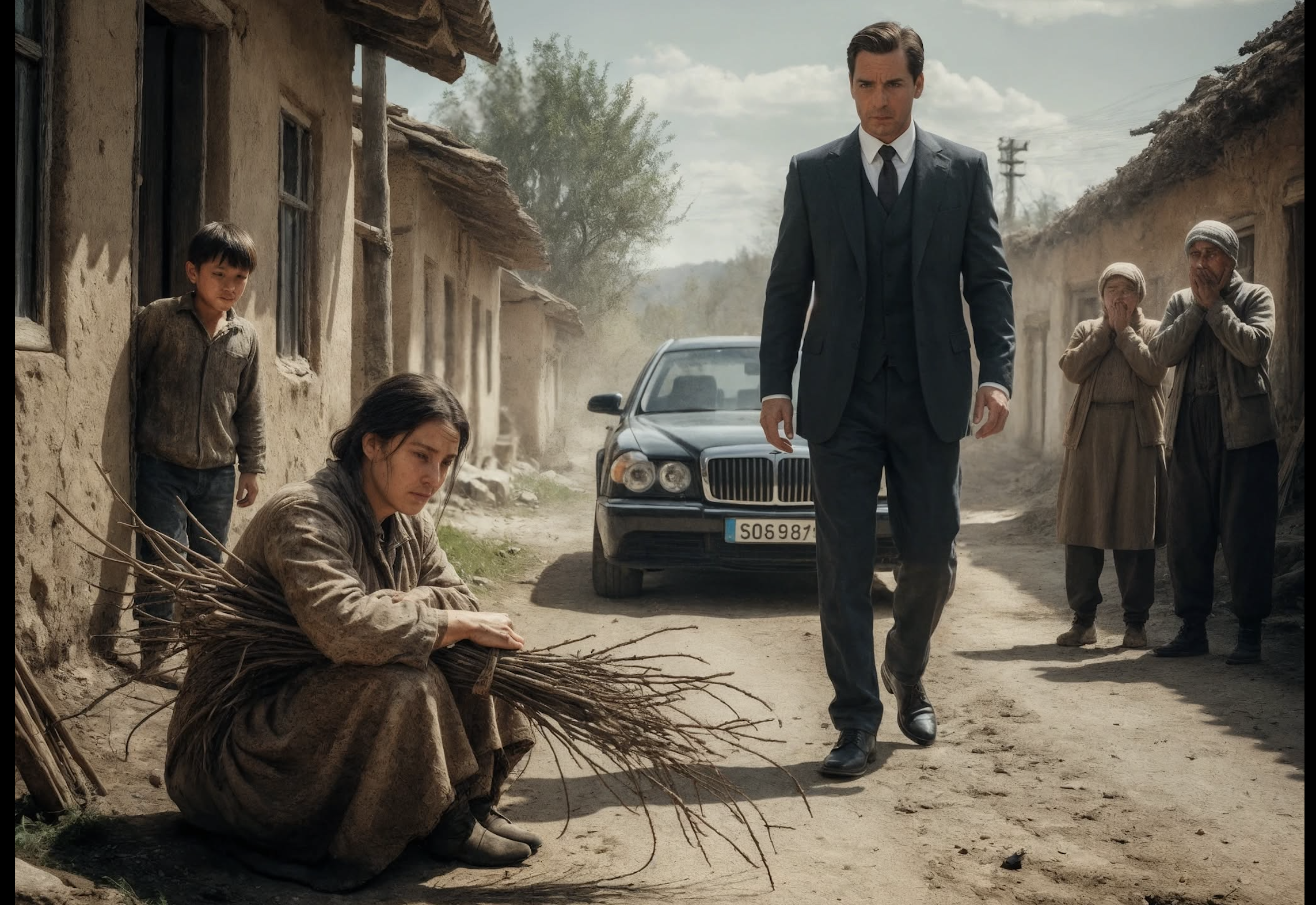Three large black sedans slowly moved along the muddy road.
“Whose cars are these?” Mrs. Nguyen asked.
“Officials? Did someone important die?”
They stopped… in front of my house. My heart leapt. Taxes? An old debt?
Minh appeared, rubbing his eyes. “Mom, whose is it?”
“I don’t know, sweetheart.”
A chauffeur in a suit opened an umbrella and helped an elderly man step out. Seventy years old, perhaps, expensive suit despite the heat, white hair carefully combed. He looked at me.
“Hanh?” he called in a broken voice.
I remained silent. He took a step, then—amid exclamations—fell to his knees in the mud.
“Please… I’ve been searching for you for so long.”
“Stand up, sir…”
“I’ve finally found you, you and my grandson.”
The world tilted. “Grandson.”
“Who are you?”
He pulled out a photo in a plastic sleeve. I recognized it immediately. Thanh. Younger, in a school uniform, in front of a luxurious house. The same smile. The same eyes.
“My name is Lam Quoc Vinh,” he said, still on his knees. “Thanh was my only son.”
“Was.” The past struck me.
“Was?”
“May I come in? This isn’t a conversation for the street.”
In my small room, he looked at our poverty with infinite sadness. Minh, in a corner, stared wide-eyed.
“He is exactly like Thanh at the same age,” said the old man. Exactly.
The Truth
“Tell me what happened. Why Thanh never returned.”
Mr. Lam closed his eyes.
“He was coming back to you. The day after the announcement of your pregnancy. He had never been so happy. He told us everything—you, the baby, the marriage.”
“And you refused.”
“No,” he said firmly. “We said yes. We wanted his happiness. He was supposed to come back and tell you the good news in the morning.”
“But he didn’t come.”
“Because that morning, he borrowed a car from me. Eager to reach you. There was an accident. A truck driver fell asleep and veered into his lane.”
I could no longer breathe.
“Thanh died instantly,” he continued, in tears. “He didn’t suffer. But he couldn’t see you again. Nor meet his son. Nor explain why he wasn’t coming back.”
The room spun. For ten years, I had imagined a thousand scenarios—the lie, parental forbidding, abandonment. Death? Too cruel to believe.
“Why didn’t you find me? Ten years!”
“We knew almost nothing. He had said ‘Hanh,’ ‘aunt’s village.’ There are seven of them in the district. And Hanh is such a common name. We searched—investigators, town halls, records… You seemed to have vanished into thin air. His aunt knew nothing; he wanted to introduce you when it was safe. After his death, no leads remained.”
He pulled out documents.
“Last month, an investigator had the idea to cross-check hospital records: births of boys to mothers named Hanh at the right time. Your name appeared. Three weeks later, we located you.”
Minh, with the logic of a child rewriting life in real-time, murmured:
“So my father didn’t leave us. He died coming back.”
“He died happy to be a father,” Mr. Lam corrected gently. “His last words to me: ‘I’m going to be a dad.’”
The Village’s Shame
Outside, the rain had stopped, but the crowd grew. When we stepped out—Mr. Lam holding Minh’s hand—the entire village was in the street.
“It’s Lam Quoc Vinh!”
“The president of the Lam group!”
“The man’s worth billions!”
“And the boy is his only grandson!”
Mrs. Nguyen rushed forward: “Hanh! I always knew there was an explanation!”
Mr. Lam stared at her coldly: “Really? Because I learned my daughter-in-law and grandson endured ten years of mockery. Were you among those who taunted them?”
She went pale. Stammered.
“Do not insult me. I know what happened,” he said in a low but relentless voice. “The trash, the insults, the deliberate cruelty.”
Silence.
He swept the crowd with his gaze: “My son loved this village. He believed people supported each other here. He was wrong. You caused suffering to a young woman who had lost the man she loved, and humiliated an innocent child. Shame on you.” Then, turning to me: “Pack your things. You’re coming with me.”
“Where?”
“To the city. To our home. You are family. My son loved you. He wanted to marry you. He died coming back. You are my daughter-in-law in every way except on paper. And this boy”—he shook Minh’s hand—“is my grandson. The heir to everything Thanh would have received.”
I looked at our hut, my world for thirty-two years. Leaving seemed impossible. Staying, now that I knew, was just as impossible.
“My things? My parents’ memories?”
“We’ll send people to pack everything. Now, I want to put you somewhere safe, away from those who took your pain as entertainment.”
Mrs. Phuong stepped forward: “Hanh, I’m sorry. For not defending you more. You deserved better.”
“Thank you,” I whispered.
Mr. Lam’s lawyer arrived with papers.
“I am placing the house and land in a trust in Hanh’s name. No one here can contest it. And I am making a donation to the school for a program on compassion and the ravages of bullying. Maybe your children will learn what you did not,” said Mr. Lam.
The mayor appeared, syrupy.
“Don’t bother,” Mr. Lam cut him off. “I’m not doing this for you.”
The Departure
The car was the most luxurious thing I had ever touched. Leather seats, silence, air conditioning. Minh sat between us, eyes wide.
“Grandfather?” he ventured.
Mr. Lam’s eyes sparkled: “Yes, my grandson?”
“My dad… did he really want us?”
“More than anything. He was already preparing your room. We never took it down.”
Four hours of driving. Mr. Lam spoke of Thanh—his childhood, music, dream of a business run with humanity.
“He would have been a wonderful father. I couldn’t give him that chance; I will do everything to give you the life he wanted.”
The Lam house was a palace. The staff bowed. A woman rushed over—Thanh’s mother. She burst into tears seeing Minh.
“He looks so much like him.”
That evening, after Minh fell asleep in a room larger than our entire house, Mrs. Lam said to me:
“Sorry for everything. If we had known…”
“I know. Your husband explained it to me.”
“You carried alone what I would have struggled to bear.”
“We do what’s right for his child.”
Six Months Later
Adjusting to the city took more effort than I imagined, but the Lams were patient and Minh adapted with the flexibility of childhood. Private school, piano, football, friends whose parents owned things beyond my comprehension. But he never forgot where he came from.
“Mom, when I take over Grandfather’s business, I want to help villages like ours. Schools, anti-bullying programs. So no one suffers like you.”
“Your father would be proud,” I said, hugging him.
Mr. Lam kept his word: he taught Minh both business and kindness. He created a foundation in Thanh’s name to support single mothers. He asked me to be one of its directors—my experience mattered.
The village changed: the school program took effect. Some wrote apologies. I read them silently. Scars remain.
Mrs. Phuong came to see us. She only wanted to make sure we were happy. We were.
The photo of Thanh, which I had kept for ten years, now stood in a silver frame, surrounded by others the family had given me. Minh stared at them for hours, building a connection with the father he had never known.
On the anniversary of Thanh’s death, we visited his grave—a monument in a wealthy cemetery, far from the simple plots of my childhood. Alone, Minh and I stayed a moment.
“Hello, Dad,” Minh whispered. “I’m your son. Grandfather says I look like you. I hope I’m like you in my heart too. Mom says you were coming back when you died. I wish I’d known you. I’ll take care of them. I’ll make you proud. I promise.”
That night, for the first time in ten years, I slept without the weight of uncertainty and shame. The truth had finally emerged: the man I loved had not abandoned us—he had died coming back. Our son would know he was wanted, cherished, loved. And I would never again bow my head for having loved someone who loved me too.
The rain that had accompanied Minh’s birth and our departure from the village had seemed like a curse. I now understand it was a blessing—it washed away the old to make room for the new. It cleared the slate so we could write another story.
This one. One where love doesn’t die but transforms. Where a decade of suffering leads to understanding. Where a boy mocked for having no father becomes the heir to an empire. Where a woman called shameful stands tall, in designer dresses, at charity galas helping other women avoid what she endured.
The village still talks about us, apparently. But the whispers have changed—tinged with regret, aware they were wrong, that their cruelty struck those who deserved compassion.
I do not hate them. Hatred requires energy I refuse to give to the past. I turn to the future—Minh’s education, the foundation’s work, the family who welcomed us.
And sometimes, late at night, I look at Thanh’s photo and whisper my gratitude.
Thank you for loving me. For wanting our son. For leaving with joy in your heart rather than regret. For these ten years of darkness that birthed a life of meaning.
“Thank you,” I say to the image. “Thank you for never truly leaving us. You are here, in Minh’s eyes, in the love of your parents, in the life you wanted for us. You kept your promise, even if it took ten years to arrive.”
The rain stopped. The storm passed. And we finally stand, after a decade of shadow, in full light.



